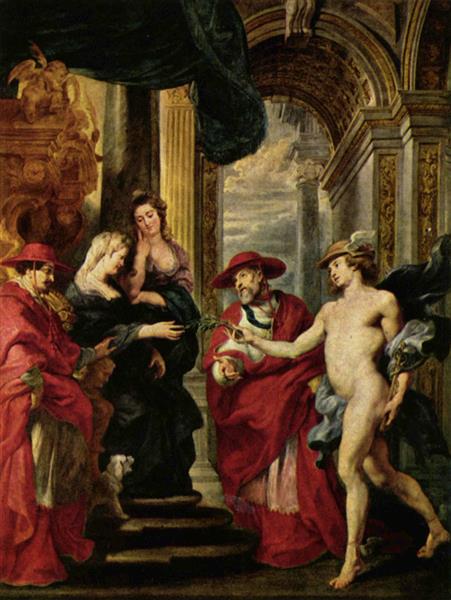Description
Peter Paul Rubens's 1625 painting The Negotiations at Angouleme offers a rich depiction of a historical moment marked by diplomacy and political intrigue against the backdrop of the religious wars that were ravaging Europe at the time. Known for his mastery of color and dynamic composition, Rubens captures the palpable tension of the negotiations through a careful arrangement of elements and figures that seem to come to life on the canvas.
The painting is characterized by an intense color palette, where warm tones predominate, evoking a sense of urgency and passion that underlies the diplomatic conversations. The use of chiaroscuro is notable, as Rubens applies this technique to emphasize the expressiveness of the faces and clothing, creating a contrast between the light that illuminates the characters and the shadows that suggest the weight of tension. The vibrant colors and the brightness of the richly decorated fabrics are representative of the opulence of the context in which the scene takes place. Green and red intertwine harmoniously, allowing each figure to stand out for its character and role in the negotiation.
Among the characters displayed in the composition, one can observe a diverse group, where expressions and body posture are key to understanding the narrative. Rubens manages to capture the emotional diversity of the individuals present; from concentration and seriousness to more open gestures that suggest the possibility of reconciliation. The arrangement of the characters, in a semicircle, creates a visual dialogue that invites the viewer to jointly engage and interpret the dynamics of power and agreement that manifest in this crucial scene.
An interesting aspect of “The Negotiations at Angouleme” is how Rubens, in addition to being a painter, was a man of his time who was immersed in the politics and culture of Europe. This is reflected in the work, where the narrative is not only limited to a historical event, but also resonates with contemporary concerns of his time, such as the search for peace and harmony in a divided world. The painting is not simply a representation of an event; it is a reflection on the impact of political decisions on people’s lives and the art of negotiation itself.
Rubens' style, distinctive to the Baroque, is manifest in the dynamism of the scene, where each figure seems to be in motion, suggesting a sense of imminence and change. This work can be compared to other contemporary pieces by him and artists of the time who also focused on the drama of human nature and social interactions, such as Hieronymus Bosch's "The Garden of Earthly Delights" in its depiction of humanity, although Rubens moves more towards the historical and political in his narrative.
Through The Negotiations at Angouleme, Rubens not only documents a moment in history, but also offers a profound study of human nature and the complex interweaving of power and diplomacy. The work stands as a testament not only to his technical mastery, but also to his ability to capture the emotions and tensions of the moment, making it a signature piece of Baroque art and a tribute to the art of negotiation.
KUADROS ©, a famous painting on your wall.
Hand-made oil painting reproductions, with the quality of professional artists and the distinctive seal of KUADROS ©.
Painting reproduction service with satisfaction guarantee. If you are not completely satisfied with the replica of your painting, we will refund 100% of your money.

